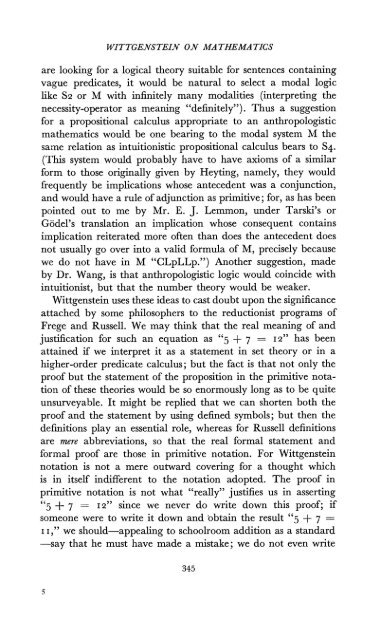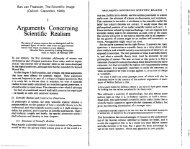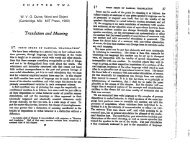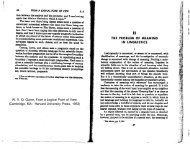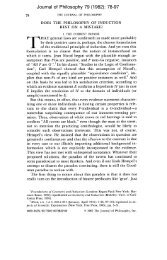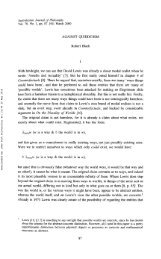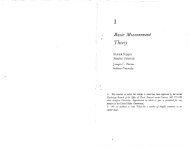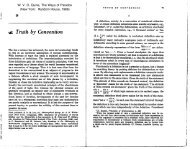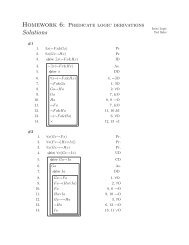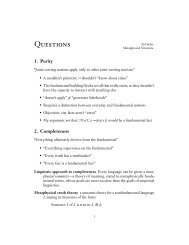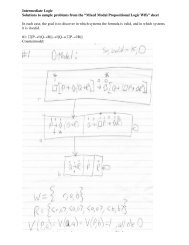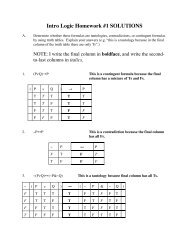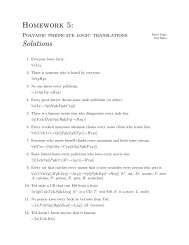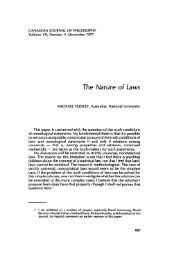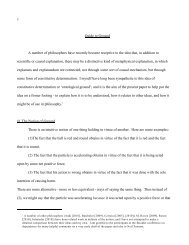Dummett - Wittgenstein's Philosophy of Mathematics.pdf - Ted Sider
Dummett - Wittgenstein's Philosophy of Mathematics.pdf - Ted Sider
Dummett - Wittgenstein's Philosophy of Mathematics.pdf - Ted Sider
You also want an ePaper? Increase the reach of your titles
YUMPU automatically turns print PDFs into web optimized ePapers that Google loves.
WITTGENSTEIN ON MATHEMATICS<br />
are looking for a logical theory suitable for sentences containing<br />
vague predicates, it would be natural to select a modal logic<br />
like S2 or M with infinitely many modalities (interpreting the<br />
necessity-operator as meaning "definitely"). Thus a suggestion<br />
for a propositional calculus appropriate to an anthropologistic<br />
mathematics would be one bearing to the modal system M the<br />
same relation as intuitionistic propositional calculus bears to S4.<br />
(This system would probably have to have axioms <strong>of</strong> a similar<br />
form to those originally given by Heyting, namely, they would<br />
frequently be implications whose antecedent was a conjunction,<br />
and would have a rule <strong>of</strong> adjunction as primitive; for, as has been<br />
pointed out to me by Mr. E. J. Lemmon, under Tarski's or<br />
Gbdel's translation an implication whose consequent contains<br />
implication reiterated more <strong>of</strong>ten than does the antecedent does<br />
not usually go over into a valid formula <strong>of</strong> M, precisely because<br />
we do not have in M "CLpLLp.") Another suggestion, made<br />
by Dr. Wang, is that anthropologistic logic would coincide with<br />
intuitionist, but that the number theory would be weaker.<br />
Wittgenstein uses these ideas to cast doubt upon the significance<br />
attached by some philosophers to the reductionist programs <strong>of</strong><br />
Frege and Russell. We may think that the real meaning <strong>of</strong> and<br />
justification for such an equation as "5 + 7 =I 2" has been<br />
attained if we interpret it as a statement in set theory or in a<br />
higher-order predicate calculus; but the fact is that not only the<br />
pro<strong>of</strong> but the statement <strong>of</strong> the proposition in the primitive nota-<br />
tion <strong>of</strong> these theories would be so enormously long as to be quite<br />
unsurveyable. It might be replied that we can shorten both the<br />
pro<strong>of</strong> and the statement by using defined symbols; but then the<br />
definitions play an essential role, whereas for Russell definitions<br />
are mere abbreviations, so that the real formal statement and<br />
formal pro<strong>of</strong> are those in primitive notation. For Wittgenstein<br />
notation is not a mere outward covering for a thought which<br />
is in itself indifferent to the notation adopted. The pro<strong>of</strong> in<br />
primitive notation is not what "really" justifies us in asserting<br />
"5 + 7 I2" since we never do write down this pro<strong>of</strong>; if<br />
someone were to write it down and obtain the result "5 + 7 -<br />
I I," we should-appealing to schoolroom addition as a standard<br />
-say that he must have made a mistake; we do not even write<br />
5<br />
345


